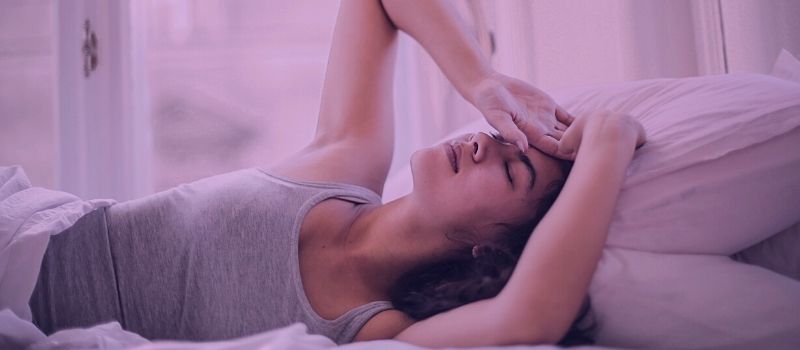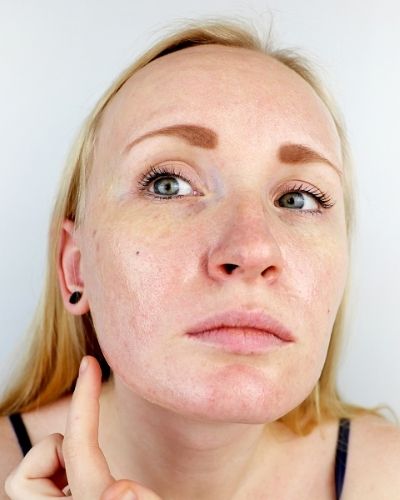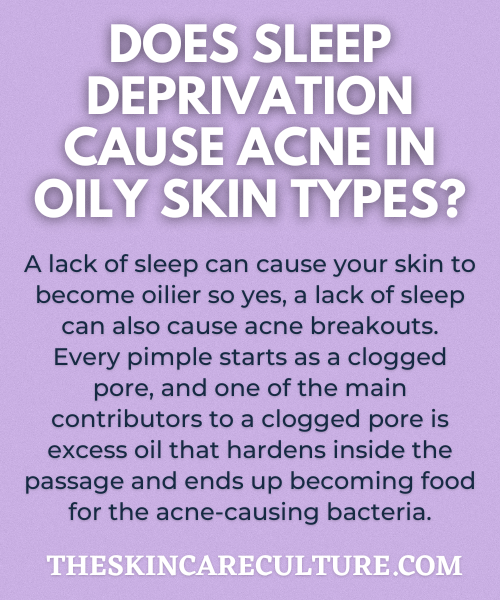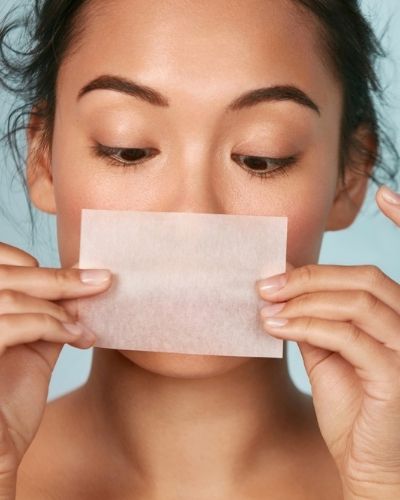We all know that acne is caused by many different things, including stress and hormonal changes.
But does sleep deprivation also contribute to the development of acne?
It’s worth noting that there is a lack of research on this particular topic and that there is only one decent study suggesting that no difference was found in the levels of sebum between good sleepers and poor sleepers.
However, from my personal experience of dealing with acne for a long time, poor quality sleep can sometimes lead to more breakouts, but it’s a little more complicated than it sounds.
So, does sleep deprivation cause acne in oily skin types? Let’s discuss.

How Does Sleep Deprivation Affect the Skin?
Some research shows that sleep deprivation can manifest itself on the face. After examining sleep-deprived individuals, it was concluded that the subjects had more hanging eyelids, redder and more swollen eyes, as well as darker circles under the eyes.
Sleep deprivation is also often associated with skin changes such as paler skin, more wrinkles or fine lines, enlarged pores, and more droopy corners of the mouth.
Another study that consisted of 32 Korean women in their 40s showed that skin hydration was significantly reduced after as little as one day of sleep deprivation, and it continued to decrease throughout the six days, which is how long the second part of the study that consisted of sleep deprivation took to be completed.
Additionally, skin texture didn’t change after only one day as skin hydration did; however, it was significantly aggravated by the fourth day of sleep deprivation.
Furthermore, skin elasticity was the most affected by reduced sleep, and the pores also appeared bigger and more prominent alongside crow’s feet and frown lines also appearing deeper and more prominent.
Lastly, skin tone changed significantly, with the skin becoming paler, sallow, and more yellowish.
Does Sleep Deprivation Cause Your Skin to Become Oilier?

From the couple of studies I listed above, we can conclude that a lack of sleep leads to oily skin because sleep deprivation depletes hydration levels in the skin.
This can lead to increased oil production by the sebaceous glands as the skin’s desperate attempt to remain hydrated and prevent dryness and discomfort.
Excessively oily skin can, in some instances, also be a contributing factor to a sallow and yellowish complexion, which is why it’s not a surprise that the Korean women, who were subjects in one of the studies, experienced a more prominent skin tone change during the times they were sleep deprived.
Lastly, excess oil can also contribute to enlarged and more prominent pores because the pore wall will expand and stretch out to accommodate the oil that passes through it.
Therefore, from all this, it seems pretty evident that sleep deprivation can cause your skin to become oilier in some instances.
Does a Lack of Sleep Cause Acne Breakouts?

Since we already concluded that lack of sleep can cause your skin to become oilier, it isn’t too much of a stretch to assume that a lack of sleep can also cause acne breakouts.
Every pimple, no matter how big or small, starts as a clogged pore, and one of the main contributors to a clogged pore is excess oil that hardens inside the passage and ends up becoming food for the acne-causing bacteria.
However, linking lack of sleep to all your skin problems, including acne, isn’t the solution either; therefore, it’s always good to watch your sleep habits and notice whether there is a change in your skin whenever you are not getting enough sleep.
Additionally, it’s worth mentioning that a lack of sleep can trigger an increase in your cortisol levels.
Cortisol, also known as the stress hormone, affects the skin in all sorts of ways, from inhibiting collagen formation and leading to premature lines and wrinkles to triggering inflammation and making your skin more prone to acne and more sensitive to allergic reactions.
A small study of 144 medical students aged 22 and 24 indicated that an increase in stress severity strongly correlated with an increase in acne severity, which was statistically significant.
And even though this wasn’t mentioned in the study but it’s just my observation; it’s not too much of a stretch to assume that the 144 medical students were also sleep deprived, based solely on the fact that they were students. Students often stay up late studying and have pretty messed up sleep habits.
Lastly, stress and lack of sleep can also make you fall off the wagon and neglect your skincare routine, which can definitely result in changes in the skin’s health and appearance, so that’s also something to consider.
RELATED: Why Does Stress Cause Acne?
Not Sure if You Have Oily Skin?

Here are the most common signs of oily skin:
- Shiny and greasy areas on your face, chest, back, and shoulders.
- Enlarged pores.
- Blackheads, whiteheads, and frequent breakouts.
If you are experiencing all these signs simultaneously, you are definitely on the oily side, and the best thing that you can do for your skin is to have a good skincare routine that consists of products to help you keep excess shine under control and maintain healthy, breakout-free complexion.
What Can I do to Treat my Oily Skin?
Here are some tips on how you can treat your oily skin:
– Cleanse your skin twice a day with a gentle, soothing cleanser that won’t strip or compromise your skin barrier and lead to excess dryness that would then trigger more oil production.
– Exfoliate your skin 2-3 times a week with an exfoliating agent such as salicylic acid or mandelic acid to address blackheads, pimples and clear out the pores from potentially clogging gunk.
– Hydrate your skin with a lightweight moisturizer or a richer serum that can double as a moisturizer.
– Use a topical retinoid such as Adapalene as a daily treatment for enlarged pores, blackheads, and pimples.
– Use a lightweight, hydrating sunscreen to protect your skin from UV damage and pigmentary changes.
– Limit the use of heavy cream-based foundations or concealers, as these are usually filled with oils and waxes that aren’t doing your oily, acne-prone skin any favor.
– Lightly powder your face with a very lightweight powder that will help neutralize excess shine throughout the day without making your makeup look cakey.
– Use a benzoyl peroxide or sulfur mask every now and again for maintenance.
– Consider getting a professional chemical peel once or twice a year to maintain happy, healthy, and glowing skin.
Conclusion
As long as you are consistent with your skincare routine, these tips on how to treat oily skin can help you achieve a balanced oil production while also ensuring that your pores will remain clear and free from congestion.
In addition to this, it may be worth trying out different sleeping positions and schedules if you think that poor sleep cycles could be affecting your skin.
You could also try meditating and switching your phone off at least an hour before going to bed, as screen time is known to affect the sleep hormone melatonin and lead to irregular sleep cycles.
Lastly, I’ve had some success with taking magnesium an hour before I go to bed, and I’ve experienced a more peaceful and continuous sleep, so that might also be something worth trying.

My name is Simone and I am a certified skin specialist. I created this website to teach my readers how to take great care of their skin and I also like to occasionally share my honest opinions on skincare products I’ve tried. You can learn more about me here.
